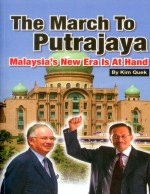 Lim Sue Goan
Lim Sue Goan
Politicians have been busy confronting with each other and all they care now is just votes. I believe that they have neglected the latest Trends in International Mathematics and Science Study (TIMSS) results.
According to the study, Malaysia had encountered the greatest drop among the 59 countries in 2011.
On average, Malaysian students scored 474 points in mathematics in 2007 but 440 points in 2011, falling from the ranking of 26th to 20th. As for science, Malaysian students scored 471 in 2007 and 426 in 2011, falling from 21st to 32nd.
Although the scores and rankings attract more attention, I am more concerned about the decline of quality among students and the younger generation.
Deputy Prime Minister and Education Minister Tan Sri Muhyiddin Yassin pointed out last month that the ministry targeted 60 per cent of new Science stream students nationwide, but achieved only less than 20 per cent.
Therefore, the government would take various measures to increase the number of science stream students, including considering tax breaks for parents.
The TIMSS results reflected the factors behind the sharp decline in the number of science stream students. Students are unable to master mathematics and science when they lack the ability to think logically. How would they dare to choose science stream if they are not good in the subjects?
According to the National Education Blueprint preliminary report, out of 74 countries participating in PISA 2009+, Malaysia performed in the bottom third for reading, mathematics, and science.
The results of PISA and the TIMSS have consistently proven that the ability of in-depth thinking among Malaysian students is still at a low level.
The lack of in-depth thinking ability will cause people unable to solve problems with knowledge. It could even lead to the lack of analytical skills. These have explained why there are so many problems in the country.
Politics is chaotic as politicians lack the ability to think. As a result, they make incoherent statements. The rare earth refinery issue has exposed the brutal facts.
A recent report pointed out that many people, including artists and dignitaries, believe that spiritualists and shamans can cure them and as a result, many were cheated and some women were even raped.
According to the police, a total of 243 people were cheated in the first 10 months of this year and Chinese alone accounted for 93 people. The total amount of losses involved is as high as RM12,499,665.
If fake spiritualists can turn believers into billionaires overnight, why do they still need to work? Who to blame if we are fooled because we cannot think logically?
Meanwhile, the popularity of the Internet has also weakened the people’s ability to think as nowadays, everyone just browses the Internet and resulted in the fall of concentration and interpretation ability. Therefore, they just parrot what others say.
The results of the annual government examinations, including the UPSR, PMR, SPM and the STPM have been getting better year by year and more and more people have scored straight A’s.
Is it because the authority has lowered the standards or the examination candidates have precisely spotted the questions, causing the government not aware of the decline of quality?
The quality of the people must be above “average” to successfully transform the economy and turn the country into a high-income state.
Politicians should stop the war of words and pay more attention to education as the top priority now is to enhance the people’s quality






















The National Education Policy
Normally, it doesn’t take thirty years to carry out an experiment and when the experiment fails it doesn’t need another thirteen years to see whether the experiment can succeed. This is exactly what is happening to our national education policy. It’s failure after thirty years, since the complete change from English to Bahasa Melayu (Bahasa Malaysia) as the main language used in national schools in 1982, seems still not convincing enough for the powers that be and with the recently introduced National Education Blueprint 2013 – 2025 (now being finalised), they still want to give the failed policy another thirteen years thinking that it will succeed without even addressing the main item that have been the reason for the failure which is the wrong choice of language used. This is extremely foolish!
Many countries are embarking on making changes or they have changed to improve and to raise the standard of education in their respective countries but our country is doing just the opposite. Examples are Singapore, China, India and Taiwan in the east and the UK, Sweden and Switzerland, in the west.
Our leaders regularly remind the people the importance of our national language, Bahasa Malaysia (BM), and they have consistently mobilised all resources available to them to promote our national language since the country gained independence in 1957.
BM, our national language, is not just a symbol of our sovereignty; it is also a symbol of our sprit and glory as an independent nation. As good citizens, all Malaysians must respect, know and use the national language. It is part and parcel of nation building.
However mastering, showing respect and using the national language are not the only determinants to build nationhood; the country must also continue to prosper, enjoy continued peace and harmony, especially in a multi-racial country like ours and, be able to compete with other countries and on a level playing field. Our leaders must not just think of the country in isolation because we are now living in a globalised and borderless world. The world is now our stage, not just the country. Therefore, learning and using another language, in a particular a global language like English, for example, is necessary in order for us to achieve prosperity and wealth and will allow our people the edge to compete with all the countries in the world, especially the developing and the developed countries, and stand a good chance of winning. We need to generate funds from outside the country as well as within. Our economic growth needs all that.
Using another language such as English language, which is a world language, together with BM, will not have any adverse effect on our people nor will it erode our values. In fact, the real effects or consequences will be the exact opposite. I am not suggesting for BM to be downgraded and be subservient to English language, BM will still remains the most important language in national schools and the country by virtue of it being our national language.
Fast forward to the 21st century, some thirty years later, the Programme for International Student Assessment (PISA) latest report place our country’s education level at 55 out of 77 countries, i.e. in the bottom third and in the report prepared by Times Higher Education (THE) World University Rankings 2012 – 13, our universities are not even listed in the top 400 in the world. IPTA graduates including many who are overseas graduates cannot even write and speak English properly resulting in many unable to secure jobs after graduating and some have been jobless for as long as three years. Many educationists, lecturers and professors in IPTAs, including some from the science and technical fields, are also not able to use English properly and as a result, they are unable to send their professional written work or research to established journals overseas that generally only accept work or research written the English language. We are well behind countries identified as Asian Tigers such as Singapore and Taiwan in many aspects, most particularly in economics, trade, finance and development, and our country was also pronounced an Asian Tiger with them at the same time about thirty years ago. Most of our graduates are unable to compete with graduates from other countries for jobs or businesses globally on equal terms. Our graduates lose all the time. If these are not the negative consequences of the policy change that the country has made in education, what are they then?
Of course, looking at the brighter side, the use of BM did become wider and better and has improved but that’s about all there is. However, if we compare to Indonesia, their use of their national language, Bahasa Indonesia (BI) is more successful and BI, in general, is now at a much higher level compared to BM.
It looks like we are neither here nor there. This may be due to our flip flop policies!
Overall, can anyone say that our national education policy is good and successful? No, I don’t think so and I believe, many people think likewise. I am not surprised if this many forms the majority.
There are many ideas, proposals, suggestions, comments and criticisms submitted by members of the public, educationist, professionals, the man-on-the-street, parents, children who are students of national schools, all are stakeholders, as well as people from countries outside Malaysia but it looks like, all those are useless to the Ministry of Education, the minister himself, politicians and people in authority who have a share in formulating our education policy.
Many writers, journalists, columnists and analysts including politicians, among others, in echoing what the leaders do and say and in encouraging the people to embrace the nationalist spirit fully as citizens, writing in mainstream and alternative newspapers (printed or online), magazines, journals, etc. regularly remind their readers or viewers how important our national language, BM, is.
However, among them, and many ‘language nationalists’ including some who are senior lecturers in public universities, professors and emeritus professors, whom I have met with, assume that with just BM and without any additional language, much less, the English language, we still can succeed. They normally state countries like China, South Korea, Japan, France, Germany, Italy, among others, and assume that all these countries are able to be fully developed, strong and successful economically and are all technologically advanced. They are all 1st World Countries in every sense. They say, “If those countries can, why can’t we?”
I have never come across those ‘language nationalists’, writers, journalists, columnists and analysts, and politicians, who had substantiated their assumption or stated why and how those countries are successful just by using only their own respective languages.
So, the question is, “Is their assumption correct?” They are all wrong!
I wonder if they are aware that all those countries they mention repeatedly have a much earlier head start than our country, some hundreds and some thousands of years before us and each of those countries have their own home grown proprietary technology and home grown products. Their technology and products have been accepted worldwide for a long time and they continually produce better products from time to time and constantly keep pace with the advancement of technology.
Compared to our country, we are still trying to play ‘catch up’ and we rely mostly on imported technology and some of them may have already been obsolete.
I watched a repeat broadcast of the National Geographic documentary titled, ’Re-launch of the iconic Nissan GTR at the 2007 Tokyo Motor Show’ in their ‘Inside Supercar’ documentary series on ASTRO NGEO Channel, the second time about two weeks ago and I saw, all the way, from the conceptual stage until Nissan showcased the car at one of the world’s most prestigious motor show, other than the commentary, in the factory, English language was used and during the various stages of the car’s development, for their engineers and technicians who do not understand the language, all the time, an interpreter was at hand to translate and explain in Japanese during all the briefing and discussion sessions, meetings and presentations. The project’s chief engineer, Kazutoshi Mizuno, is both fluent in Japanese and English and of course, their CEO, Carlos Ghosn, who does not speak any Japanese at all, uses English with the help of an interpreter.
When they made their pitch to critics and car magazine top writers and journalists from the US, Europe and Asia, English language was used throughout. Not a single Japanese (word) was used except of course only, Nissan, the brand and the company’s name.
So, for those people in this country, in their campaign against the use of English language, who think, say, assume or insist that the Japanese use only their own language and do not use English language to succeed should check their facts again.
The example on Nissan which I mention above is not an isolated case, there are many similar examples available and not only Japanese examples but examples by countries like China, Korea and even Taiwan that use English language extensively in promoting their products, services and even the development and the promotion of their countries. Try watch CCTV News on ASTRO and one will be most pleased when one listens to how well the China’s Chinese TV presenters, both men and women, speak English.
In the case of Europeans, besides using their own respective languages, they all speak English and with varying degrees of fluency and unlike here, there are no lecturers or university professors from any university in Europe who cannot put up a good original academic paper in good fluent English. When I met a couple from the Czech Republic, an East European country, on a train ride from KL to Singapore recently, they both spoke to me in fluent English.
I have worked with people of various nationalities, viz., British, Americans, Canadians, Australians, New Zealanders, Europeans (Germans, Belgians, Dutch, French, Italians, Spanish, the then Yugoslavians) and Asians including people from China and Japan outside their respective countries and all the people from the countries mentioned that I have worked or did business with, speak English. Even the people from some Arab countries and countries in Northern Africa such as Sudan, Saudi Arabia, Jordan, Kuwait, Iran, Algeria, Syria, Lebanon, United Arab Emirates and Egypt, who I encountered in my course of work and business, speak English. People from South American countries such as Chile, Mexico, Brazil and Argentina who did business and some work with us (and later with me) also speak English.
Some people here say that we are the world leader in technology related to palm oil and its by-products. Are we?
Nevertheless, even if we are, what language do we use for the research, marketing and promotion of that commodity that is now being consumed all over the world if not English language?
Can our palm oil and some of its related products be as successful as they are today if we had used only BM?
Yes, there are many research papers on oil palm written in BM but they are only for local use and consumption only, not for use internationally. Those used overseas are in English, either written by the very few who know English or the original scripts written in BM by our local scientists was translated into English. This further shows how important English language is.
Sentiments must be put aside and we must be bold and committed enough to face realty. We must now correct and improve our overall national education policy and system as soon as possible. Our leaders must also have the political will and stamina to make the policy successful.
Let us, concerned Malaysians and in particular young Malaysians, be given the opportunity to contribute more to the country and in order for this to be realised, we urge the government to accept our non-stop appeal for our young people and our children and the children of the coming generations to be taught in English language besides BM so that they can all become good bilinguals. It will also be easier for them to follow courses when they get into universities to study for their degrees either locally or overseas.
Malaysians, especially the young, those who are in national schools and children of the future generations, must be taught and trained in both languages and make mastering BM and English language so that they will can be equally good in both as the main aim. This should be made a policy and should be included in the revised Malaysia Education Blueprint 2013 – 2025.
If need be, MBMMBI should be enhanced, revamped or revised totally by increasing the English language content in it to achieve that aim.
So, correct all the mistakes, do not repeat any of them and let’s move forward instead of backwards with a better national education policy and plans.
Hussaini Abdul Karim
Comment by hak55 — December 16, 2012 @ 4:52 PM |
2020 = Most stupid nation in the world
Comment by tigeryk — December 16, 2012 @ 10:32 AM |
Half baked graduates are good materials for the continuation of the civil service under UMNO dominated BN rule. That is one of the main agenda.
Comment by Peter Sawai — December 16, 2012 @ 7:42 AM |